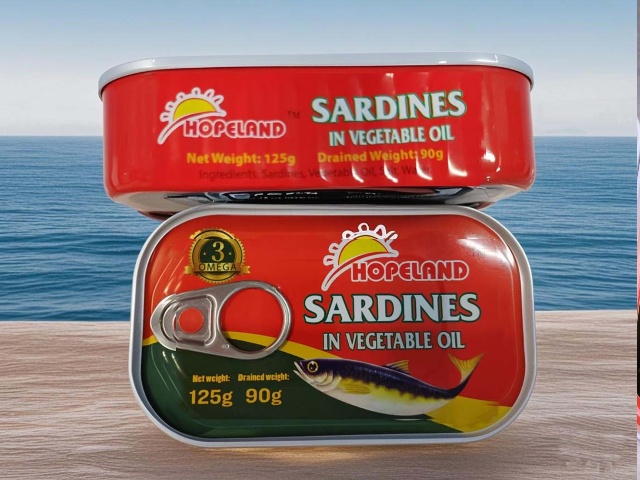Health Benefits of Canned Sardines
When it comes to nutrient-rich, convenient, and affordable foods, canned sardines are often overlooked. For many people, the idea of eating fish from a can may not sound appealing at first. Yet sardines are one of the most powerful superfoods available—packed with protein, healthy fats, vitamins, and minerals that contribute to overall well-being. What makes canned sardines even more valuable is their accessibility: they are inexpensive, widely available, and easy to store, making them a practical choice for people across the globe.
In this article, we’ll explore in detail the health benefits of canned sardines, why they deserve a place in your diet, and how to enjoy them in various delicious ways. By the end, you may find yourself reaching for a can of sardines not just as an emergency pantry item but as a regular addition to your healthy eating plan.
1. Nutritional Profile of Canned Sardines
Before diving into their health benefits, it’s important to understand what makes sardines nutritionally special. A standard 3.75-ounce (106-gram) can of sardines in oil typically contains:
Calories: About 190–200
Protein: 22–24 grams
Fat: 10–12 grams (including omega-3 fatty acids)
Calcium: About 35% of the daily recommended intake
Vitamin D: 40–45% of daily needs
Vitamin B12: Over 100% of daily needs
Selenium: Around 70% of daily needs
Iron, magnesium, phosphorus, potassium, and zinc: Moderate amounts
This powerhouse profile explains why sardines are considered one of the most nutrient-dense foods per calorie. They deliver a strong mix of macronutrients (protein and fat) along with micronutrients essential for bone, heart, and metabolic health.
2. Rich Source of Omega-3 Fatty Acids
Perhaps the most celebrated benefit of sardines is their high omega-3 fatty acid content. Omega-3s are essential fats that the body cannot produce on its own, making dietary sources crucial.
Heart health: Omega-3s reduce triglycerides, lower blood pressure, and decrease the risk of plaque buildup in arteries.
Brain function: These fats are vital for cognitive function, mood regulation, and may lower the risk of depression and neurodegenerative diseases.
Inflammation reduction: Omega-3s have strong anti-inflammatory properties, which can help with arthritis, joint pain, and chronic inflammation-related conditions.
A single can of sardines can provide more than 1,500 mg of omega-3 fatty acids, which is well above the daily recommended intake.
3. Excellent Protein Source
Canned sardines are an easy way to boost your protein intake without relying on expensive cuts of meat or protein powders. Protein plays a critical role in:
Building and repairing muscles
Supporting hormone and enzyme production
Maintaining strong immune function
Helping with satiety and weight management
Since sardines provide around 22 grams of high-quality protein per serving, they’re ideal for athletes, growing children, or anyone trying to maintain lean muscle mass.
4. Bone Health Booster
Unlike many fish, sardines are typically canned with their tiny, edible bones. This makes them an outstanding source of calcium—even better than dairy in some respects.
A single can of sardines can supply one-third of the daily recommended calcium intake.
Combined with vitamin D and phosphorus, also abundant in sardines, they provide a perfect trio of nutrients essential for strong bones and teeth.
For people who are lactose intolerant or vegan-leaning but still eat fish (pescatarians), sardines can serve as a reliable, non-dairy calcium source.
Consuming sardines regularly may help prevent osteoporosis and improve long-term skeletal health.
5. Supports Heart and Circulatory Health
Canned sardines provide several compounds that work together to protect the cardiovascular system:
Omega-3 fatty acids improve cholesterol ratios by lowering LDL (“bad” cholesterol) and raising HDL (“good” cholesterol).
Selenium acts as an antioxidant, reducing oxidative stress that can damage arteries.
Magnesium and potassium regulate blood pressure by supporting healthy blood vessel function.
Coenzyme Q10 (CoQ10), naturally present in sardines, supports heart muscle energy and may reduce the risk of heart failure.
Studies consistently show that diets high in oily fish like sardines reduce the risk of cardiovascular disease.
6. Brain Health and Cognitive Benefits
Fish consumption has long been linked with improved brain health, and sardines are no exception. Their high levels of omega-3 fatty acids, vitamin B12, and selenium support cognitive performance.
Omega-3 DHA helps build and maintain brain cell membranes, crucial for memory and learning.
Vitamin B12 prevents nerve damage and supports the production of neurotransmitters.
Selenium may protect against neurodegenerative diseases such as Alzheimer’s by reducing oxidative stress in brain tissue.
Regular consumption of sardines may contribute to improved concentration, reduced risk of depression, and better long-term cognitive function.
7. Energy and Metabolism Support
Canned sardines are particularly rich in vitamin B12, a nutrient essential for energy production. A single can provides more than 100% of your daily needs.
Vitamin B12 helps convert food into usable energy.
It supports the formation of red blood cells, preventing anemia-related fatigue.
It works with folate and B6 to regulate homocysteine levels, reducing heart disease risk.
For people who experience fatigue, low energy, or difficulty concentrating, adding sardines to their diet can provide a natural boost.
8. Weight Management and Satiety
Despite being calorie-dense, sardines are an excellent choice for weight-conscious eaters. The combination of protein and healthy fats keeps you feeling full longer, reducing cravings for less nutritious snacks.
Protein slows digestion, helping control appetite.
Omega-3s may improve metabolism and fat-burning efficiency.
Low glycemic index: Sardines have no carbohydrates, making them blood sugar-friendly for people with diabetes or insulin resistance.
Replacing processed snacks with a can of sardines can be a simple step toward better weight management.
9. Immune System Strengthening
Nutrients in sardines collectively support immune health:
Vitamin D helps regulate immune response.
Selenium functions as a powerful antioxidant, defending against infections.
Zinc supports wound healing and resistance to illness.
Protein provides the amino acids necessary for building immune cells.
For those looking for a natural immune-boosting food, sardines are an excellent addition.
10. Low in Mercury and Safer Than Larger Fish
One major concern with fish consumption is mercury contamination. Larger fish like tuna, swordfish, and king mackerel accumulate mercury as they age and grow. Sardines, being small and low on the food chain, contain very low mercury levels, making them a safer choice for regular consumption.
This makes sardines particularly suitable for children, pregnant women, and anyone concerned about heavy metal exposure.
11. Environmental Sustainability
Beyond personal health, sardines are also considered one of the most eco-friendly seafood choices.
They are abundant and reproduce quickly, reducing the risk of overfishing.
Harvesting sardines requires fewer resources compared to larger fish.
Choosing sustainably sourced sardines supports ocean ecosystems and responsible fisheries.
For eco-conscious eaters, sardines align with both nutritional and environmental values.
12. Convenience and Affordability
Practical benefits also matter in daily life. Sardines score high in:
Shelf stability: They can last for years without refrigeration.
Affordability: A can of sardines often costs a fraction of fresh fish or meat while delivering equal or greater nutrition.
Convenience: No cooking required—open the can and eat, or easily add to recipes.
These qualities make sardines a reliable emergency food, travel snack, or quick meal ingredient.
13. Ways to Enjoy Canned Sardines
If you’re new to sardines, the flavor may take some getting used to. But with creative preparation, they can become a delicious staple. Here are some ideas:
On toast: Spread mashed avocado on whole-grain toast and top with sardines and lemon juice.
In salads: Add sardines to a Mediterranean salad with tomatoes, cucumbers, olives, and feta cheese.
In pasta: Toss sardines with garlic, olive oil, chili flakes, and spaghetti for a quick, flavorful meal.
As a snack: Enjoy straight from the can with whole-grain crackers.
In soups and stews: Stir sardines into tomato-based soups for extra protein and depth of flavor.
In sandwiches: Mix sardines with a little Greek yogurt or mustard for a nutrient-packed sandwich spread.
Experimenting with different cuisines can help integrate sardines more seamlessly into your diet.
14. Possible Drawbacks and Considerations
While sardines are highly beneficial, it’s worth noting a few considerations:
Sodium content: Some canned sardines are high in salt. Look for low-sodium versions if you’re managing blood pressure.
Oil-packed vs. water-packed: Oil-packed sardines have more calories but may taste richer. Water-packed ones are lighter and a better choice for calorie control.
Allergies: People with fish allergies must avoid sardines.
Purine content: Sardines are high in purines, which may not be suitable for individuals with gout.
Choosing high-quality brands and moderating intake can address most concerns.
15. Conclusion: A Nutritional Powerhouse in a Can
Canned sardines may come in a humble package, but they deliver extraordinary health benefits. They are:
Rich in omega-3 fatty acids, supporting heart and brain health
Packed with protein for muscle and energy needs
Excellent sources of calcium, vitamin D, and B12
Low in mercury and environmentally sustainable
Affordable, convenient, and versatile in recipes
For those seeking a simple, nutritious, and sustainable food choice, sardines deserve a spot in the weekly diet plan. Whether you eat them straight from the can, toss them into a salad, or mix them into a pasta dish, sardines provide a delicious and nutrient-dense boost for long-term health.






